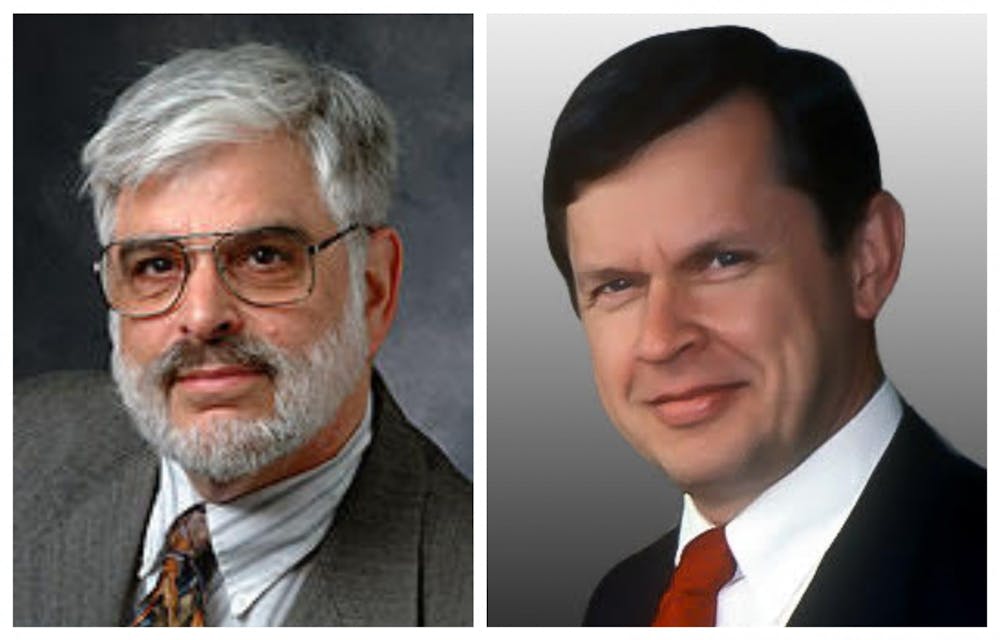Two University graduate alumni and longtime collaborators, Alfred Aho GS ’67 and Jeffrey Ullman GS ’66, received the 2020 ACM A. M. Turing Award, widely considered to be the highest technical distinction in the field of computer science.
Named in honor of the English mathematician and computer scientist Alan Turing GS ’38, the Turing Award has been presented annually by the Association of Computing Machinery since 1966. The award recognizes “major contributions of lasting importance to computing” and carries a monetary award of $1 million, with financial support provided by Google, Inc.
Ullman, the Stanford W. Ascherman Professor of Computer Science, Emeritus, at Stanford University, and Aho, the Lawrence Gussman Professor of Computer Science, Emeritus, at Columbia University, shared the award for “[shaping] the foundations of programming language compilers and algorithms,” the association announced on Wednesday, March 31.
Aho and Ullman are most widely known for their work in developing compilers, a crucial set of tools without which most modern programs operating on personal computers, smartphones, and automobiles would not be able to function.
Modern software is usually written in high-level programming languages that are relatively intuitive to the human mind, but in order to help computers understand the instructions given to them, those languages must be translated, or compiled, into the binary codes of ones and zeros with which computers can operate.
“People tell computers what to do by writing things in programming languages [like Python or R]. The compilation process takes a language that you and I could understand and converts that into ultimately the binary numbers that a computer actually uses to execute a program,” University Professor of Computer Science Brian Kernighan GS ’69 explained.
“There is actually a systematic process by which you can take a language at some level and convert it into lower levels,” Kerighan added. “And so that's what Al and Jeff were working on.”
In addition to their research achievements, the award also cited the nine highly influential textbooks Ullman and Aho co-authored, which have been used to train millions of computer scientists and engineers around the world.

Aho graduated with a Bachelor of Arts and Science in engineering physics from the University of Toronto in 1963, and Ullman graduated with a Bachelor of Science in engineering mathematics from Columbia University in the same year. The two came to the University to pursue graduate studies in electrical engineering and computer science soon after finishing their undergraduate studies.
According to Aho, the two met each other while waiting in line to register for the Ph.D. program in 1963, and “hit it off.”
“Jeff had found his thesis topic for his Ph.D. at the end of his second year and spent the third year typing up his thesis, one page at a time,” Aho recounted. “And I was tearing out my hair because I didn't have a Ph.D. thesis topic at the time.”
Aho explained that Edward McCluskey, who had recruited him to Princeton for his graduate studies, was hired by Stanford University midway through Aho’s Ph.D. studies. Aho was forced to find a new advisor in John Hopcroft and search for a new thesis topic.

Ullman received his Ph.D. in 1966 after completing a doctoral dissertation titled “Synchronization error correcting codes,” while Aho received his Ph.D. a year later in 1967 after completing a doctoral dissertation titled “Indexed grammars, an extension of context free grammars.”
Upon completing their graduate studies, Ullman and Aho both went on to work for Bell Laboratories in Murray Hills, N.J., where they began their early work on developing efficient algorithms used for the analysis and translation of programming languages.
Ullman returned to academia as an assistant professor at the University in 1969 and then joined the faculty at Stanford University in 1979, where one of his many doctoral students was Google co-founder Sergey Brin. Aho remained at Bell Labs for several decades before joining the computer science department at Columbia University in 1995.
Despite no longer working at the same institution, the two continued their fruitful collaboration that lasted decades and shaped the world of computer science.
Ullman stated that he is likely to give away his half of the $1 million award, while Aho said that he just wants to “do some good” with his half of the award. Both expressed their feelings of humility and gratitude.
When asked about his reactions to receiving the award, Ullman said, “I guess I’m suffering a little bit from imposter syndrome. It’s nice to be recognized and, frankly, I was really not expecting this.”
Aho shared that the chair of the award selection committee asked him to have a Zoom call to discuss an important question in early March, and Aho expected to be asked to serve on the selection committee like he has in the past. Instead, it was a surprise virtual congratulations party in which he and Ullman found out that they had just won the highest honor of their field.
“This was the most fun announcement I had ever seen or been part of,” Aho remarked.








